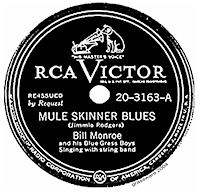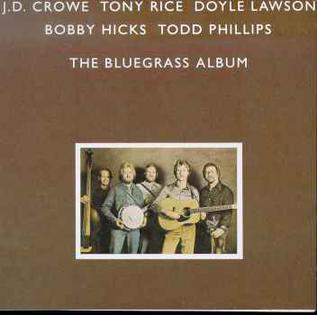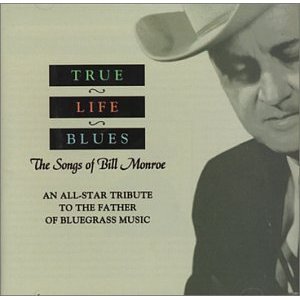Related Research Articles

William Smith Monroe was an American mandolinist, singer, and songwriter, who created the bluegrass music genre. Because of this, he is often called the "Father of Bluegrass".

Bluegrass music is a genre of American roots music that developed in the 1940s in the Appalachian region of the United States. The genre derives its name from the band Bill Monroe and the Blue Grass Boys. Like mainstream country music, it largely developed out of old-time string music, though in contrast, bluegrass is traditionally played exclusively on acoustic instruments and also has roots in traditional English, Scottish, and Irish ballads and dance tunes as well as in blues and jazz. Bluegrass was further developed by musicians who played with Monroe, including 5-string banjo player Earl Scruggs and guitarist Lester Flatt. Monroe characterized the genre as: "Scottish bagpipes and ole-time fiddlin'. It's a part of Methodist, Holiness and Baptist traditions. It's blues and jazz, and it has a high lonesome sound."
"Blue Moon of Kentucky" is a waltz written in 1945 by bluegrass musician Bill Monroe and recorded by his band, the Blue Grass Boys. The song has since been recorded by many artists, including Elvis Presley and Paul McCartney. "Blue Moon of Kentucky" is the official bluegrass song of Kentucky.

"Silver Dagger", with variants such as "Katy Dear", "Molly Dear", "The Green Fields and Meadows", "Awake, Awake, Ye Drowsy Sleepers" and others, is an American folk ballad, whose origins lie possibly in Britain. These songs of different titles are closely related, and two strands in particular became popular in commercial Country music and Folk music recordings of the twentieth century: the "Silver Dagger" version popularised by Joan Baez, and the "Katy Dear" versions popularised by close harmony brother duets such as The Callahan Brothers, The Blue Sky Boys and The Louvin Brothers.
"Banks of the Ohio", also known as "Down on the Banks of the Ohio" and "I'll Never Be Yours", is a 19th-century murder ballad, written by unknown authors. The lyrics tell of "Willie" who invites his young lover for a walk during which she rejects his marriage proposal, and once they are alone on the river bank, he murders the young woman.

Delano Floyd McCoury is an American bluegrass musician. As leader of the Del McCoury Band, he plays guitar and sings lead vocals along with his two sons, Ronnie McCoury and Rob McCoury, who play mandolin and banjo respectively. In June 2010, he received a National Heritage Fellowship lifetime achievement award from the National Endowment for the Arts and in 2011 he was elected into the International Bluegrass Music Hall of Fame.

Peter Rowan is an American bluegrass musician and composer. Rowan plays guitar and mandolin, yodels and sings.

"Blue Yodel no. 8, Mule Skinner Blues" is a classic country song written by Jimmie Rodgers. The song was first recorded by Rodgers in 1930 and has been recorded by many artists since then, acquiring the de facto title "Mule Skinner Blues" after Rodgers named it "Blue Yodel #8".
Ten Broeck was an American U.S. Racing Hall of Fame Thoroughbred racehorse whose 1878 match race win in Louisville, against the great California mare Mollie McCarty was immortalized in the Kentucky folk song commonly called "Molly and Tenbrooks".
"Darlin' Cory" is a well-known American folk song about love, loss, and moonshine. It is similar in theme to "Little Maggie" and "The Gambling Man" but is not considered the same as those songs.

Kenneth Clayton Baker was an American fiddle player best known for his 25-year tenure with Bill Monroe and his group The Blue Grass Boys.

Mollie McCarty,, foaled in 1873, was an outstanding California-based Thoroughbred racehorse who won her first 13 race starts and was second on the two occasions when she was defeated.

Rickie Lee Skaggs, known professionally as Ricky Skaggs, is an American neotraditional country and bluegrass singer, musician, producer, and composer. He primarily plays mandolin; however, he also plays fiddle, guitar, mandocaster, and banjo.
Mike Compton is an American bluegrass mandolin player and former protégé of the Father of Bluegrass, Bill Monroe. He is considered a modern master of bluegrass mandolin.

The Bluegrass Album is the debut album by bluegrass supergroup, Bluegrass Album Band, released in 1981. It's a collection of bluegrass standards by Lester Flatt, Bill Monroe, Earl Scruggs, Ralph Stanley and others. Ultimately, four volumes were released, recorded between 1980 and 1985.
The Ten Broek–Mollie McCarty match race was a match race on July 4, 1878, between Ten Broeck, a stallion from Kentucky, and Mollie McCarty, a mare from California. The race was held at the Louisville Jockey Club in front of a record crowd of 30,000. Both horses were champions of the period, and the win by Ten Broeck marked the first loss of Mollie McCarty's career. The race was immortalized in the folk song, Molly and Tenbrooks.

True Life Blues: The Songs of Bill Monroe is a compilation album of bluegrass music released through Sugar Hill Records on October 15, 1996. It was a tribute to Bill Monroe. In 1997, the album won Todd Phillips the Grammy Award for Best Bluegrass Album, as the producer.
Bluegrass fiddling is a distinctive style of American fiddle playing which is characterized by bold, bluesy improvisation, off-beat "chopping", and sophisticated use of both double-stops and old-time bowing patterns.

Mollie O'Brien is an Americana, bluegrass, R&B, and folk singer from Wheeling, West Virginia. She has released a number of Americana albums with her brother, Grammy-winner Tim O'Brien. She has also released five positively received solo albums. She is currently based in Denver, and regularly tours and performs with her husband, guitarist Rich Moore, as a duo. Together they have released one studio album, Saints and Sinners and a live CD, 900 Baseline. She has regularly appeared on shows such as A Prairie Home Companion, Mountain Stage, and contributed vocals to the Grammy-winning album True Life Blues: The Songs of Bill Monroe. She is known for her interpretations of classic songs by artists such as Tom Waits, Memphis Minnie, Willie Dixon, Chuck Berry, Si Kahn, Terence Trent D'Arby, and Kate MacLeod.
Bill Grant and Delia Bell were a bluegrass music duo from Oklahoma. Emmylou Harris has said of Delia Bell: "If Hank Williams and Kitty Wells had married and had a daughter, she would have sounded like Delia Bell." Grant was recognized as "Ambassador of Bluegrass Music" by three Oklahoma governors.
References
- Rosenberg, Neil V. 1985. Bluegrass: A History. Urbana: University of Illinois Press
- Wolfe, Charles K. 1996. Kentucky Country: Folk and Country Music of Kentucky. Lexington: University Press of Kentucky